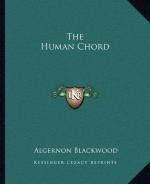“I hope to lead you little by little to what I have in view,” Mr. Skale went on, “so that at the end of our trial month you will have learned enough to enable you to form a decision, yet not enough to—to use my knowledge should you choose to return to the world.”
It was very frank, but the secretary did not feel offended. He accepted the explanation as perfectly reasonable. In his mind he knew full well what his choice would be. This was the supreme adventure he had been so long a-seeking. No ordinary obstacle could prevent his accepting it.
II
There came a pause of some length, in which Spinrobin found nothing particular to say. The lamp gurgled; the coals fell softly into the fender. Then suddenly Mr. Skale rose and stood with his back to the grate. He gazed down upon the small figure in the chair. He towered there, a kindly giant, enthusiasm burning in his eyes like lamps. His voice was very deep, his manner more solemn than before when he spoke.
“So far, so good,” he said, “and now, with your permission, Mr. Spinrobin, I should like to go a step further. I should like to take—your note.”
“My note?” exclaimed the other, thinking he had not heard correctly.
“Your sound, yes,” repeated the clergyman.
“My sound!” piped the little man, vastly puzzled, his voice shrill with excitement. He dodged about in the depths of his big leather chair, as though movement might bring explanation.
Mr. Skale watched him calmly. “I want to get the vibrations of your voice, and then see what pattern they produce in the sand,” he said.
“Oh, in the sand, yes; quite so,” replied the secretary. He remembered how the vibrations of an elastic membrane can throw dry sand, loosely scattered upon its surface, into various floral and geometrical figures. Chladni’s figures, he seemed to remember, they were called after their discoverer. But Mr. Skale’s purpose in the main, of course, escaped him.
“You don’t object?”
“On the contrary, I am greatly interested.” He stood up on the mat beside his employer.
“I wish to make quite sure,” the clergyman added gravely, “that your voice, your note, is what I think it is—accurately in harmony with mine and Miriam’s and Mrs. Mawle’s. The pattern it makes will help to prove this.”
The secretary bowed in perplexed silence, while Mr. Skale crossed the room and took a violin from its case. The golden varnish of its ribs and back gleamed in the lamplight, and when the clergyman drew the bow across the strings to tune it, smooth, mellow sounds, soft and resonant as bells, filled the room. Evidently he knew how to handle the instrument. The notes died away in a murmur.
“A Guarnerius,” he explained, “and a perfect pedigree specimen; it has the most sensitive structure imaginable, and carries vibrations almost like a human nerve. For instance, while I speak,” he added, laying the violin upon his companion’s hand, “you will feel the vibrations of my voice run through the wood into your palm.”




